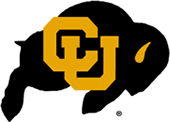|
|
HOME ~ College Football History |
School Colors
The official colors of CU are silver and gold. According to the book
Glory Colorado, these colors were adopted by the class of 1888, as a
symbol of the mineral wealth of this state. But in 1921, as football
became more popular, there were complaints
 from the students that silver
and gold did not look good on football jerseys. In fact, silver and gold
ended up looking like dirty gray and dark yellow. It wasn't until 1959
that the football team changed its jerseys to black with yellow. And
although the football team seems to have set the trend with its color
choice, CU still has the official colors of silver and gold. from the students that silver
and gold did not look good on football jerseys. In fact, silver and gold
ended up looking like dirty gray and dark yellow. It wasn't until 1959
that the football team changed its jerseys to black with yellow. And
although the football team seems to have set the trend with its color
choice, CU still has the official colors of silver and gold.
Buffaloes
The buffalo first appeared in 1934, three weeks after a contest to
select an official school nickname by the Silver and Gold newspaper had
come to an end and "Buffaloes" was the winning entry. The nickname was
officially bestowed upon the school's teams at halftime of the
Homecoming game against Utah. For the final game of the '34 season, some
students paid $25 to rent a buffalo calf mascot along with a real cowboy
as his keeper. It took the cowboy and four students to keep the calf
under control on the sidelines, a 7-0 win over the University of Denver
on Thanksgiving Day.
Prior to 1934, CU athletic teams usually were referred to as the "Silver
and Gold", but other nicknames teams were sometimes called included
Silver Helmets, Yellow Jackets, Hornets, Arapahoes, Big Horns, Grizzlies
and Frontiersmen. The campus newspaper announced the contest in the fall
of 1934, with a $5 prize to go to the author of the winning selection.
Claude Bates of New Madrid, Mo., and James Proffitt of Cincinnati, Ohio,
were co-winners for the prize as both submitted Buffaloes as their
entry. Athletic Director Harry Carlson, graduate manager Walter Franklin
and Kenneth Bundy of the Silver and Gold were the judges. Through the
years, synonyms which quickly came into use included "Bison", "Buffs",
"Thundering Herd", "Stampeding Herd", "Golden Avalanche", and "Golden
Buffaloes".
The "Ralphie" tradition began October 1, 1966 when Buddy Hays of
Boulder's Hidden Valley Ranch first brought a six-month old buffalo calf
to Folsom Field. The parade around the then-existing cinder track was
relatively inconspicuous. From that time on, the pre-game and second
half charges of Ralphie around the perimeter of the playing field (and
often through the ranks of visiting teams) has been one of the great
spectacles of college athletics.
CU, not UC
A question often asked of many former Big Eight schools: Why is it the
University of Colorado, but the moniker is CU and not UC? (The same
applies at Kansas-KU, Missouri-MU, Nebraska-NU and Oklahoma-OU).
"Midwestern casualness," says CU historian Fred Casotti. It has always
been this way at Colorado, for whatever reason, and at the other four
listed above-but seemingly nowhere else in the USA.
In the 1950s, there was a concerted effort to eliminate the use of "CU"
on the Boulder campus, both as a symbol and in speech, but Casotti said
that no one would buy into it. "Nobody would change," he said. "It's
easier to say than U of C, UC sounds like slang or something (as in 'you
see'), and it was traditional. By trying to eliminate it, they
reinforced it."
Ralphie the Buffalo
The University of Colorado has the most unique mascot in all of
intercollegiate atheltics, a real buffalo named Ralphie. The live
buffalo mascot, actually "Ralphie IV," will continue the tradition of
leading the football team out on the field both at the start of the game
and the second half.
It is truly one of the special sights that exists anywhere in college or
professional sports, especially for opposing teams, who often stop in
their tracks watching the massive buffalo round the end zone and head
directly at their sideline.
CU Fight Song
Fight CU down the field,
CU must win
Fight, fight for victory
CU knows no defeat
We'll roll up a mighty score
Never give in
Shoulder to shoulder
We will fight, fight
Fight, fight, fight!
Alma Mater
Hail, all hail our alma mater
Ever will our hearts be true
You will live with us forever
Loyal will we be to you
We sing forever your praises
Evermore our love renew
Pledge our whole devotion to you
Dear old CU.
Home Page
 |

 from the students that silver
and gold did not look good on football jerseys. In fact, silver and gold
ended up looking like dirty gray and dark yellow. It wasn't until 1959
that the football team changed its jerseys to black with yellow. And
although the football team seems to have set the trend with its color
choice, CU still has the official colors of silver and gold.
from the students that silver
and gold did not look good on football jerseys. In fact, silver and gold
ended up looking like dirty gray and dark yellow. It wasn't until 1959
that the football team changed its jerseys to black with yellow. And
although the football team seems to have set the trend with its color
choice, CU still has the official colors of silver and gold.